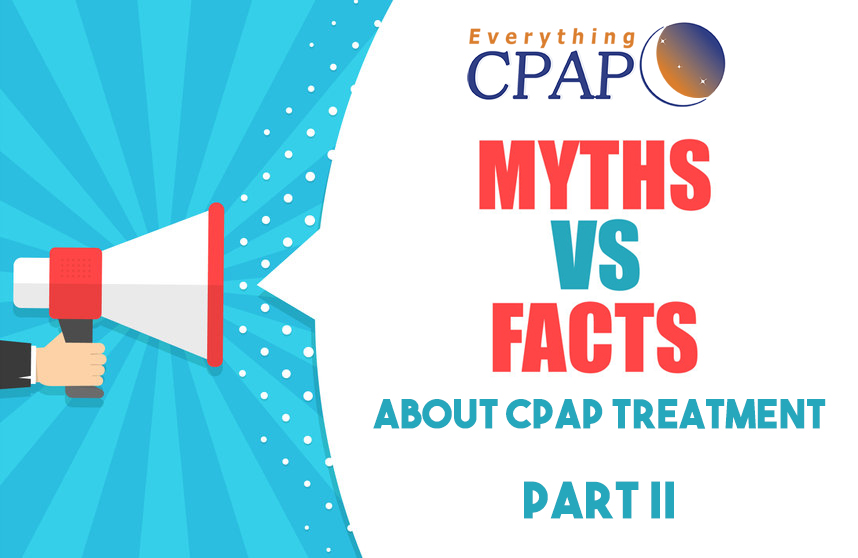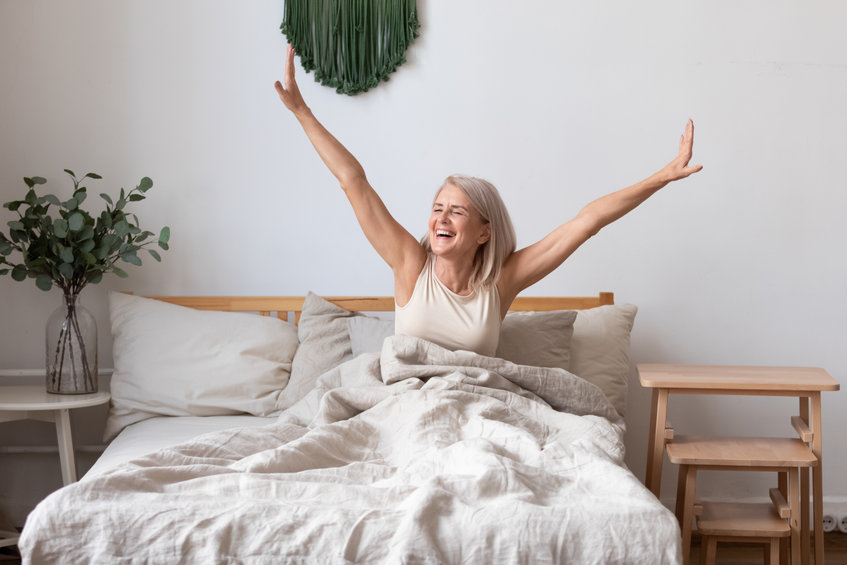MYTH #1: CPAP Treatment is Uncomfortable
Like with anything new, there is definitely an adjustment period with CPAP masks and devices, and many complain at first that the CPAP therapy is just too uncomfortable (annoying, obstructive, awkward, cumbersome) to use every night to get a good night’s sleep. But did you know that in time, with needed adjustments, you can learn to not only endure but be completely satisfied with your CPAP treatment plan and actually begin to depend on it each night? The key is … Don’t give up.
“If at first you don’t success, try, try, try again.”
– William Edward Hickson
At Everything CPAP, we listen carefully to our patients’ needs and concerns, so that we can find the best way to handle each concern or discomfort. With over 20+ years’ experience in the CPAP industry, we only recommend products that we know are high quality, high-tech and innovative, from well vetted brands, and are well-received by our patients. So here are some common adjustments we put into place when a patient is uncomfortable:
The CPAP Mask:
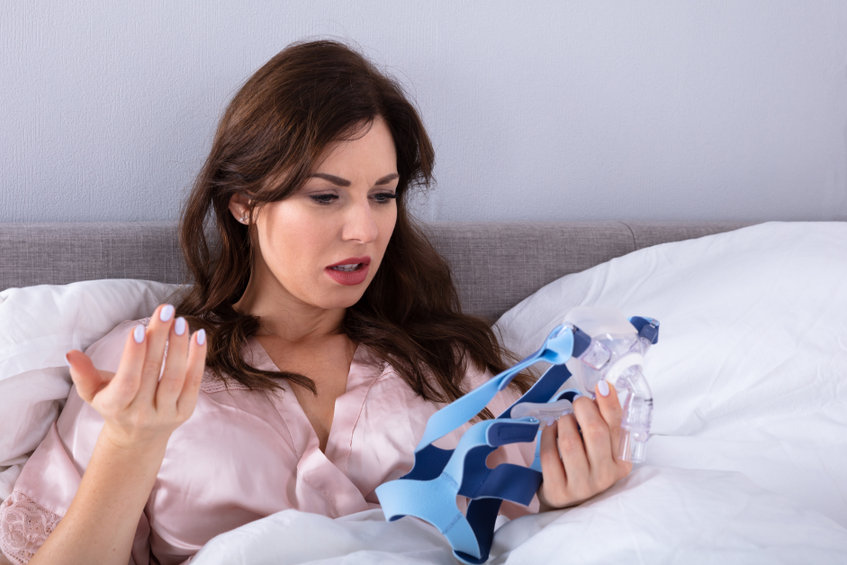
There are three types of masks (full face, nasal and nasal pillow masks) to choose from, with a slew of options in each category from various brands. A patient may not know which mask will work for them. Our highly trained staff can assess which style of mask may work for you. If that mask does not work, then we can provide you with a demo mask of your choice, to use for the next few nights, and if you are not satisfied or comfortable with the first demo mask, we can set you up with another demo mask to try, and so on … until we find the right mask that works for our patients. Our 30-day mask guarantee allows us the ability to make sure we get the right mask for you.
- [Read the article “Which Type of CPAP Mask is Best for Me” for a full description of each mask type, who they are best suited for and how we ensure the right mask for each patient.]
We also offer Mask Fittings and Trainings on how to setup, clean, maintain and use your CPAP mask and device. We have a wide range of CPAP masks in three categories: Full Face Mask, Nasal Mask, and Nasal Pillow Mask. Continuous positive airway pressure (CPAP) masks and headgear come in many styles and sizes to comfortably treat your sleep apnea with variations in the various styles and brands that are on the market.
Everything CPAP offers a 30-Day Mask Fit Guarantee, which offers our patients an unconditional Mask Fit Guarantee with over 200 mask options, proper fitting by our staff at our initial visit as well as ongoing support for our patients. We don’t always get it right the first time, so that is why we offer a full 30 days (or nights) so patients can try out their mask and swap out until we get it right. Remember the goal is to provide our patient’s a better night’s sleep and improved health.
Dry Nose or Mouth & Throat:
A dry mouth can be a common issue for those with OSA, especially for ‘mouth-breather’ (those who sleep with their mouth open). This issue is only exacerbated if using the wrong mask or if the mask is not fitted properly. We respond to this concern first by making sure your mask if fitted properly and that one is not experiencing a high leak. Second, we can make comfort setting changes on your device. Some of these changes can be adjustment to your humidifier or heated tubing (if equipped). The CPAP humidifier adds moisture to the therapy air. If your CPAP machine does not have humidification an alternative are Xylimelts (Link to Xylimelts)
The Device Pressure Settings:
If the pressure settings are too high or too low, you may feel discomfort in your mouth, throat, nose or airway, which can make it difficult to fall asleep and cause your overall therapy to be ineffective. An errant pressure setting can also cause Aerophagia, which causes the patient to swallow too much air that results in stomach cramps, gas, bloating and burping. Other symptoms include dry mouth, waking up through the night, and excessive fatigue during the day. If you are having any of these issues, we recommend speaking with your sleep specialist. If you are new to CPAP, it may take some comfort adjustment setting changes to your machine. Even experienced users of CPAP may need changes from time to time.
Some adjustments that can be made:
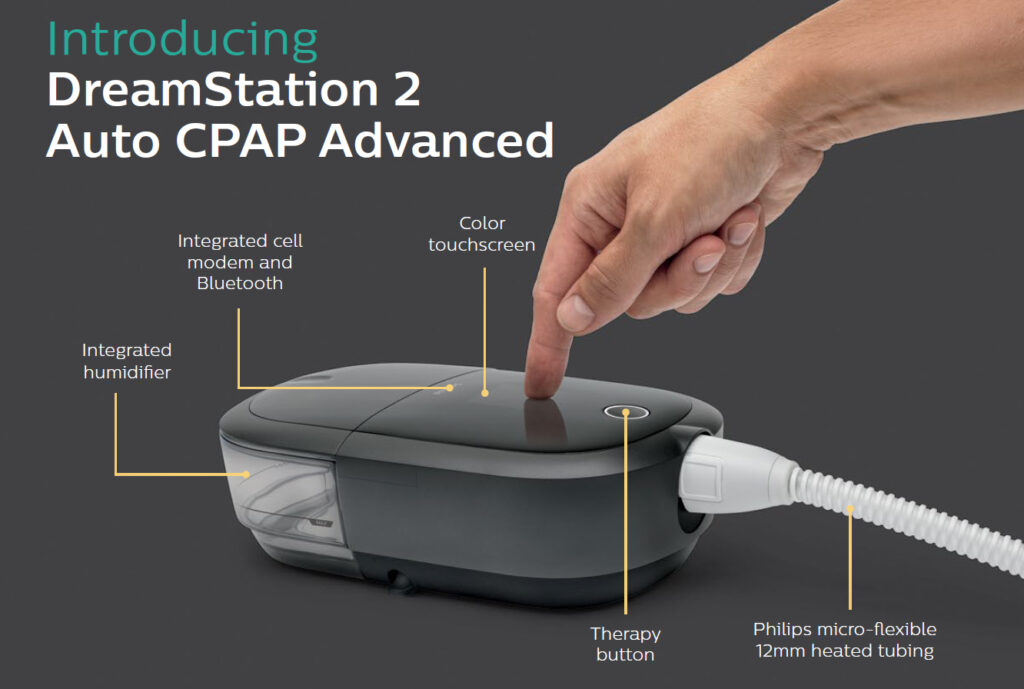
- Expiratory pressure Relief (EPR) and sometimes referred to as Flex. These settings automatically drop air pressure during exhalation, which may help reduce or eliminate aerophagia. It can also help with adjusting to therapy for first time users.
- or machine with Ramp settings, which gradually increase pressure as the patient falls
- changing mask styles or adding a chin strap if you are breathing through your mouth versus your nose.
- for those that sleep in a supine position may find benefit from using a wedge pillow. This will incline your sleeping position and may help with aerophagia
- Not a comfort setting but only for severe cases a sleep specialist may recommend a different PAP therapy.
- Switching the patient to an auto-adjusting CPAP machine (APAP) or Bi-Level. [Read our blog, “A Personalized Approach to your CPAP Therapy” to learn more about the five types of PAP machines and their functionality differences.]
Whatever the issue is regarding comfort and difficulty in successful CPAP adherence, we are here to listen and to provide solutions with an individualized approach to your care. Our staff will follow up with each of our patients regularly to answer any questions, go over any concerns, retrain or find alternative solutions if they are struggling with any difficulty.
With our remote ongoing monitoring and reporting, we can detect some issues and concerns to provide adjustments or doctor-recommended solutions. But some concerns or issues cannot be detected, so we encourage our patients to feel free to reach out to us. We are here to help with 24/7 Technical Support with our experienced, trained and certified staff to address those concerns.
Recommended Accessories to Improve Comfort Level:
- Chinstrap: helps prevent dry mouth, leak events, mouth breathing, snoring and increase restful and effective therapy: SHOP NOW
- CPAP Bed Pillow: allows you to sleep comfortably and in compliance with its unique features made especially for nightly PAP Therapy users. SHOP NOW
- XyliMelts: find temporary relief from frequent thirst, sticky dryness in the mouth and throat, and other unpleasant dry mouth symptoms. SHOP NOW
- RemZZZ CPAP Mask Liners: acts as a soft barrier between the silicone nasal cushion and face to reduce noisy air leaks, protect irritated skin from moisture or red marks. SHOP NOW
- Aromatherapy: Pur-Sleep can help you get used to your CPAP so you can get some sleep, universally Compatible with All CPAP/BiPAP Machines, and to lightly scent the air drawn into your CPAP to promote a more conducive sleep environment. SHOP NOW
- Fabric Wraps: used for all types of masks to reduce irritation and increase comfort. SHOP NOW
MYTH #2: CPAP Therapy is Expensive
CPAP Therapy includes the device, the mask, the tubing, the filters, the cushions, humidifier and any other accessories that may be needed or prescribed for effective care. Cost for the CPAP machine alone can run anywhere from a few hundred to few thousand dollars, with the cost of the CPAP machine varying based on the machine’s additional features and functionality.
For Patients With Insurance Coverages
If the patient has health insurance coverage, the good news is that most health insurance companies cover the cost of the CPAP Machines and accessories, if prescribed by your physician or approved sleep professional. Some health insurance companies require sleepers to ‘rent’ their CPAP machines for a certain amount of time, three months to a 13 months, to ensure the patient is showing compliance before the patient can own it outright.
Insurers do not want to pay for medical equipment that is not being used, so your insurance company may require a copy of your sleep data and monitoring records to ensure compliance. Most insurers require a three-month or 10-month trial for the patient to test out the device; to ensure that the patient and their healthcare provider agree that the treatment is tolerable and effective. If approved after the trial period, an insurer will often pay the monthly rental fee or pay for the full cost of machine (minus any deductibles or insurance fees of a specific plan).
Here is the current Insurance Coverage schedule for CPAP devices and supplies (this can vary based on each insurance company so our staff can verify insurance coverage and frequency before you begin):
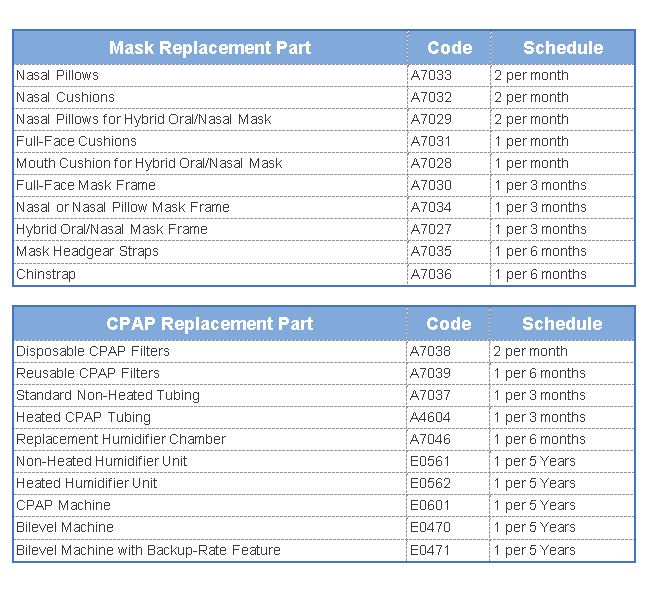
* Check with your individual provider to find out their particular coverage benefits or call our office, as our staff is well-versed in many insurances providers’ coverage. We can also contact your insurance company to confirm authorization before treatment begins.
For Patients Without Insurance Coverage
If you do not have insurance, please note you will still need a prescription form your physician. For our non-insured clients, please call our office during business hours so we can find the best solution to your CPAP needs and budget. We can provide customized payment plans and possible discounts to fit your needs.
And if you think CPAP Therapy is expensive, calculate the cost of hypertension, diabetes, cardiovascular and heart disease, car or work-related accidents related to fatigue, ADHD and depression and/or anxiety. Untreated OSA or sleep apnea has an increased risk of all of the above. Thus, it would be much more cost-effective to use CPAP Therapy to prevent the onset of much more expensive and debilitating health problems.
MYTH #3: CPAP Treatment is a One-Size-Fits-All System
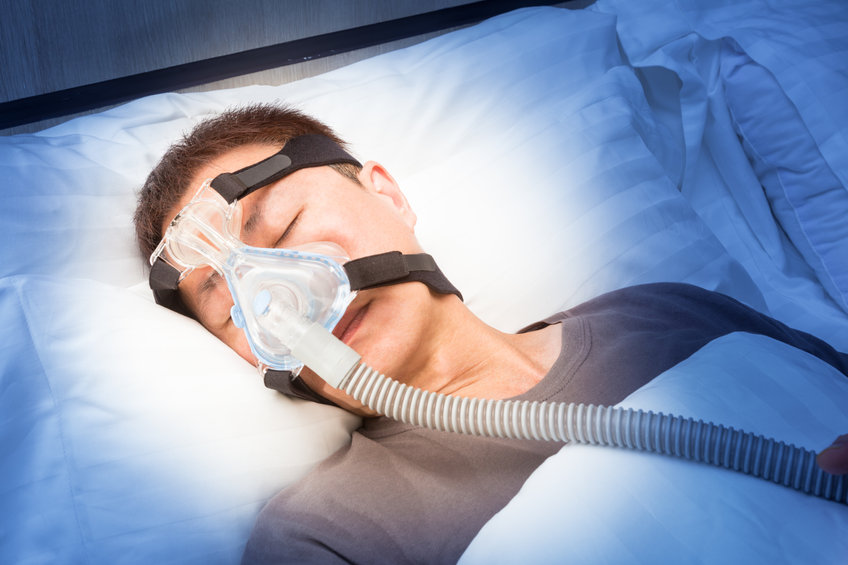
Some patients come to us thinking, ‘If you’ve tried one CPAP mask, you’ve tried them all. And they all are uncomfortable.’ When CPAP therapy was introduced, it was one-size-fits-all. But as they say, we’ve come a long way baby … we now have more ways to improve patients’ compliance. In recent years, there are now a whole variety of mask styles, machines and devices, filters, and parts and supplies developed and innovation continues to improve on comfort and usability.
We can customize your experience by the following CPAP-related Variables:
- We have a wide range of CPAP masks in three categories: Full Face Mask, Nasal Mask, and Nasal Pillow Mask.
- We offer solutions for types of devices including CPAP, APAP or AutoPAP, BiPAP or Bilevel, ASV and BiLevel with Backup Rate.
- We can also guide you with doctor-recommended pressure settings, which are based on the AHI (apnea-hypopnea index) which is scored on how many times you stop breathing over the course of an hour of sleep.
- We can adjust ramp settings, which is used to designate the amount of time it will take to ramp to a set pressure.
- We can adjust EPR settings, which maintains the optimal treatment for the patient during inhalation and reduces pressure during exhalation
- We can recommend machines that are equipped with expiratory relief, which will lower the pressure when you exhale and slowly increase the pressure when you inhale.
- We can increase or lower humidification levels, which adds moisture to your therapy air.
- Our patients can choose heating or non-heated tubing. Using heated tubing can counter irritation and dryness in even the most sensitive patients.
- We can recommend CPAP compliant aromatherapy because some patients might find the smell of the water vapors a deterrent.
- There are also a host of add-ons, accessories to improve comfort and compliance. (See our online store for some of these.)
There are also alternatives to CPAP Therapy including:
- Oral appliances: These plastic inserts fit into the mouth and prevent the tongue and tissues in the back of the throat from collapsing over the airway during sleep.
- Inspire Sleep Apnea Innovation: This a new FDA approved device that can be surgically implanted to monitor your breathing while you sleep and opens your airway. You must be 22 years or older and fall in the Body Mass Index range for their height and weight to be considered for this handheld remote device.
MYTH #4: There is Insufficient Ongoing Support & Help with your CPAP Treatment, after your Initial Trial Period

You are not alone in your CPAP journey. First off, your CPAP equipment and supplies are considered as Durable Medical Equipment (DME), which means that not only is your equipment covered (by most insurance providers), but also the mask, filters, tubing and headgear, as well as ongoing support including fittings, trainings, ongoing reporting and monitoring and technical support.
Not all DME suppliers are the same, and not all provide a listening ear and responsive solutions, especially post-trial period or once the insurance provided had determined compliance and paid for the machine. Besides refilling orders of supplies and parts, many DME’s do not provide the hands-on and responsive support Everything CPAP offers.
Everything CPAP is Idaho’s number one CPAP supply company because it is our mission to make sure we do everything we can to help you have a great experience from the first time you come in and every time after for years to come. From patient education, fittings and trainings, our ongoing monitoring and regular follow-ups, we have a high rate of compliance compared to our competitors.
While other companies may be too big to care about you as a patient or use outdated technologies, at Everything CPAP you can rest assured knowing that you will have the best treatment available. We strive to make sure our patients receive the care they deserve and the help they need to be successful in treating their sleep apnea.
MYTH #5: I Could Suffocate if the Power Goes Out (with a Full-Face Mask)
First off, the only conceivable scenario where this is considered a possibility by some patients, is with full face masks as it covers the nose and mouth. While we’ve heard this concern from several patients over the years, we want to make absolutely clear … this is NOT TRUE. You will never be at risk of suffocating in a full-face mask because all masks are design with exhalation ports built into them. These ports allow C02 to be released to allow normal breathing if the machine stops for any reason during the night.
So the answer is no, you will NOT suffocate or die if your CPAP machine loses power.
MYTH #6: CPAP Treatment cures Obstructive Sleep Apnea
CPAP is a treatment for you Sleep Apnea or sleep disorder breathing, it is not a cure. While you’re using CPAP, your sleep apnea symptoms stop or greatly decrease, depending on the effectiveness of your treatment plan and your commitment to compliance. If you stop using CPAP, your sleep apnea symptoms will come back. As long as you have sleep apnea, you will continue to need to use CPAP therapy.
MYTH #7: Utilizing CPAP Treatment makes me Unattractive
While sleeping with a mask on may be a little awkward and cumbersome at first, and while you are not going to be inclined to prance any cat walks while wearing one, your appearance can be greatly improved from CPAP compliance in just a few of months of treatment. See what one study showed:
“Patients with obstructive sleep apnea are perceived to appear more alert, more youthful, and more attractive after adherent use of positive airway pressure.”
– NIH Study, The Face of Sleepiness: Improvement in Appearance after Treatment of Sleep Apnea
The above study took pictures before and after, and with improved sleep came a decrease in forehead surface volume, and less redness under the eyes and cheeks.
Another study found that “sleep deprivation included hanging eyelids, red and swollen eyes, dark circles under the eyes, paler skin, more wrinkles, and drooping corners of the mouth.”
– Sleep Journal Cues of Fatigue: Effects of Sleep Deprivation on Facial Appearance.
That’s why they call it Beauty Sleep! And it will not only improve your facial appearance but your mood and what is more beautiful than a calm, happy and well-rested soul?
Have any questions?
If you have further myths that you’d like to get clarification on or any questions related to CPAP Therapy, please do not hesitate to contact our staff.
- Call Us: (208) 323-CPAP Extension #2727
- Email Us: [email protected]


